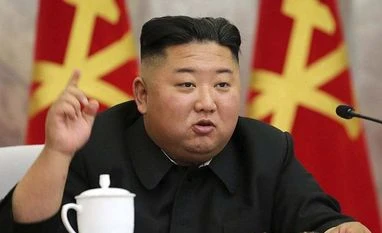North Korea celebrates 75th party anniversary amid economic woes
North Korea celebrated the 75th anniversary of its ruling party with outside observers expecting leader Kim Jong Un to take centrestage in a massive military parade in capital Pyongyang
)
Kim Jong Un
North Korea on Saturday celebrated the 75th anniversary of its ruling party with outside observers expecting leader Kim Jong Un to take centrestage in a massive military parade in capital Pyongyang, where the North could possibly unveil the latest weapons in its growing nuclear force threatening U.S. allies and the American mainland.
It wasn't immediately clear as of Saturday morning whether any events were proceeding.
A programming schedule announced by North Korean television didn't include plans to broadcast a military parade and mass rally, which South Korean government officials and private analysts have said were being prepared at Pyongyang's Kim Il Sung Square.
While North Korean TV had provided live coverage of a 2017 military parade honouring the birth of Kim's late grandfather and state founder Kim Il Sung, the next two military parades in 2018 were recorded and broadcast later.
This year's anniversary comes amid deadlocked nuclear negotiations with the Trump administration and deepening economic woes, which analysts say are shaping up as one of the biggest tests of Kim's leadership since he took power in 2011.
Also Read
South Korean officials and analysts have said North Korea could showcase a new intercontinental ballistic missile or other nuclear-capable weapons during a parade, which would highlight how the country has continued to expand its military capabilities amid stalled nuclear talks.
But while he may put on a huge display of his military hardware, analysts say Kim will likely avoid direct or harsh criticism toward Washington during his speech at the event and instead focus on a domestic message of unity in face of economic hardship.
Many analysts believe North Korea will avoid serious negotiations or provocations before the U.S. presidential election in November as a change in US government could force the country to recalibrate its approach toward Washington and Seoul.
Authoritarian North Korea is keen about anniversaries, especially ones that fall on every fifth or 10th year, and this week's festivities were earmarked for years in advance as a major event to glorify Kim's achievements as leader.
But there hasn't been much to celebrate lately as Kim struggles to keep afloat an economy crippled by years of stringent U.S.-led sanctions over his nuclear program and ravaged further this year by border closures amid the COVID-19 pandemic and devastating summer floods and typhoons that will likely worsen chronic food shortages.
The problems, combined with North Korea's depleting foreign currency reserves, are possibly setting conditions for a "perfect storm" that shocks food prices and exchange rates and triggers economic panic in coming months, said Lim Soo-ho, an analyst at Seoul's Institute for National Security Strategy.
That would compound the political burden on Kim, who during a political conference in August showed unusual candour by acknowledging that his economic plans aren't succeeding. The ruling Workers' Party scheduled a rare congress in January 2021 to set development goals for the next five years.
Kim could also use the congress to announce new foreign policy directions toward Washington and Seoul.
Kim and President Donald Trump have met three times since embarking on high-stakes nuclear diplomacy in 2018 as the North Korean leader attempted to leverage his nukes for badly needed sanctions relief and security benefits.
But talks have faltered over disagreements on disarmament steps and the removal of sanctions imposed on the North, which in recent months has repeatedly stated it would never again gift Trump with high-profile meetings he could boast of as foreign policy achievements unless it gets something substantial in return.
(Only the headline and picture of this report may have been reworked by the Business Standard staff; the rest of the content is auto-generated from a syndicated feed.)
More From This Section
Don't miss the most important news and views of the day. Get them on our Telegram channel
First Published: Oct 10 2020 | 9:26 AM IST
